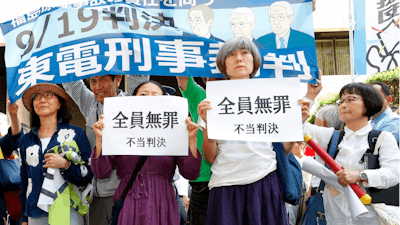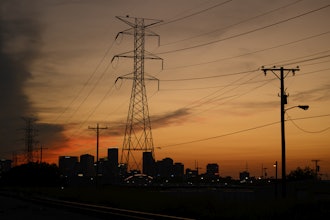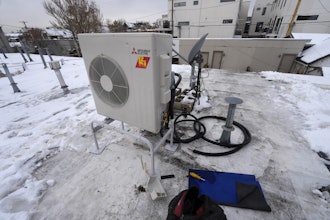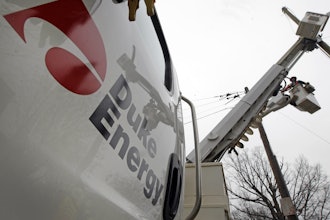
TOKYO (AP) — A Japanese court ruled Thursday that three former executives of Tokyo Electric Power Company were not guilty of professional negligence in the 2011 disaster at the Fukushima nuclear power plant because ensuring absolute safety at nuclear plants was not a government requirement at that time.
The ruling by the Tokyo District Court ended the only criminal trial related to the nuclear accident that has kept tens of thousands of residents away from their homes because of lingering radiation contamination.
Lawyers representing the 5,700 Fukushima residents who filed the criminal complaint said they will push prosecutors to appeal the decision. A group of supporters stood outside the court Thursday with placards reading "Unjust ruling."
The court said ex-TEPCO Chairman Tsunehisa Katsumata, 79, and two other former executives were also not guilty of causing the deaths of 44 elderly patients whose health deteriorated during or after forced evacuations from a local hospital.
The executives were accused of failing to anticipate the massive tsunami that struck the Fukushima Dai-ichi nuclear plant on March 11, 2011, following a magnitude 9 earthquake, and of failing to take measures that might have protected the plant.
Katsumata and co-defendants Sakae Muto, 69, and Ichiro Takekuro, 73, pleaded not guilty at the trial's opening session in June 2017. They said predicting the tsunami was impossible.
Three of the plant's reactors had meltdowns, spreading radiation into surrounding communities and into the sea.
Prosecutors in December requested five-year prison sentences for each executive, accusing them of not doing enough to guard against the threat of a large tsunami despite knowing the risk.
In its ruling, the court said the defendants held responsible positions at TEPCO, but that did not necessarily mean they were responsible for taking measures beyond those in the legal regulatory framework.
It said there is no proof they could have foreseen that a tsunami could flood the plant the way it did in 2011.
TEPCO officials were aware of a need to improve tsunami prevention measures and were considering taking steps by 2008 and 2009, but those steps were in line with government safety standards at the time.
The prosecutors argued that TEPCO could have prevented the disaster had it halted the plant to install safety measures before the tsunami. But the court said the company's responsibility to supply electricity to the public meant that idling the plant would have had a "social impact," and that possible measures were likely not ready in time.
The acquittal disappointed dozens of Fukushima residents and their supporters who attended the ruling.
Hiroyuki Kawai, a lawyer for the plaintiffs, said the decision must be appealed.
"The ruling showed that the judge did not understand the dangers of nuclear plants at all, and it was sympathetic to the company executives and their management decisions," Kawai said. "The ruling sounded as if it was written by supporters of nuclear energy."
Prosecutors had told the court that the three defendants had access to data and scientific studies that anticipated the possibility of a tsunami exceeding 10 meters (33 feet) which could trigger a loss of power and a severe accident.
Defense attorneys told the court that the tsunami prediction was not well established. They said the actual damage was larger than projected, and that if TEPCO had taken steps based on the projection, it would not have prevented the disaster.
TEPCO declined to comment directly on the ruling but pledged to devote itself to the compensation of disaster-hit people and the cleanup of the plant and its surroundings while enhancing the safety of nuclear plants "with unwavering determination."
Katsumata apologized "to the people for causing tremendous trouble" in a statement released by his lawyer.
More than eight years since the disaster, the Fukushima plant has been stabilized and being decommissioned — a decades-long process that is still at an early stage. TEPCO is struggling with massive amounts of treated but still radioactive water that is stored in 1,000 tanks on the compound, hampering the cleanup work.
Prosecutors said TEPCO was conducting a tsunami safety review following a 2007 earthquake in Niigata in northern Japan that damaged another TEPCO plant, and the three former executives routinely participated in that process. In March 2008, a TEPCO subsidiary projected that a tsunami as high as 15.7 meters (47 feet) could hit Fukushima, prompting the company to consider building seawalls, but the executives allegedly delayed the idea to avoid additional spending.
Prosecutors presented hundreds of pieces of evidence including emails between safety officials and the two vice presidents that suggested increasing concern and a need for more tsunami defenses at the plant. More than 20 TEPCO officials and scientists testified in court.
Government and parliamentary investigations said TEPCO's lack of a safety culture and weak risk management, including an underestimation of tsunami risks, led to the disaster. They said TEPCO colluded with regulators to disregard tsunami protection measures.
The company has said it could have been more proactive with safety measures, but that it could not anticipate the massive tsunami that crippled the plant.
TEPCO has spent 9 trillion yen ($83 billion) on compensation related to the disaster. It needs to spend an estimated 8 trillion yen ($74 billion) to decommission the plant and 6 trillion yen ($55 billion) for decontamination.





















